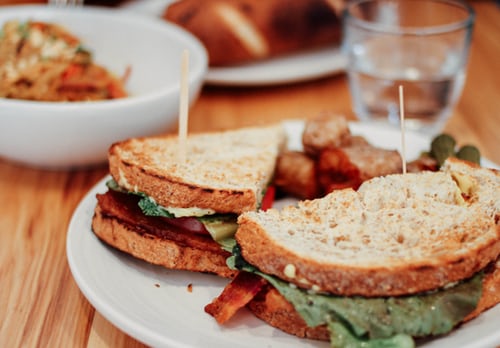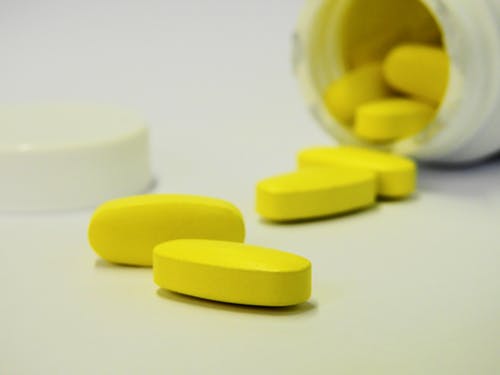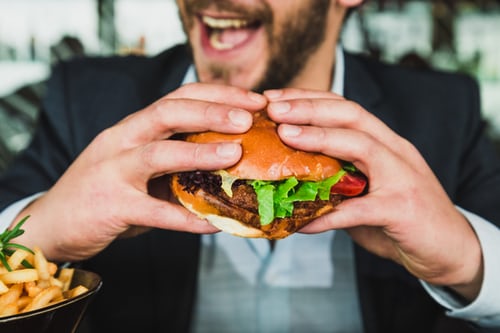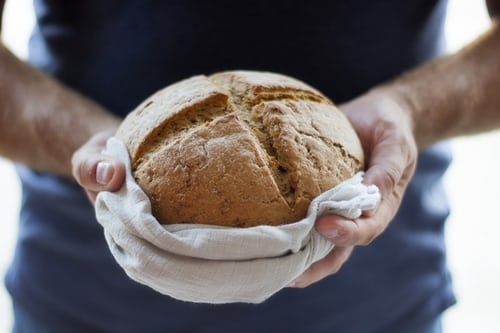In a nutshell the whole purpose of eating food is to obtain the stuff within it because the stuff within it is what your body has evolved to rely upon in order to keep you alive (and when you are well fed not just alive but also healthy and functioning optimally).
So, what is this magical life sustaining “stuff” within food?
First and foremost, it is energy.
More than any other reason you eat food to provide your body with the energy it needs to continue to carry out all the subcellular chemical reactions that allow you to continue growing, repairing, learning, moving, talking, thinking, connecting, and essentially being you.
Secondly, you eat food because your body needs a variety of different micronutrients (vitamins and minerals) to continue to carry out these reactions and as actual substrate for what makes up your physical body.
On top of these two key components of why you munch (from the perspective of your body that is because of course in the reality of our complicated little human lives there are far more reasons why we chose to munch or not much in any given moment) there are many other compounds within foods that are not essential to life but which we know are disease preventing and health promoting.
These other compounds include beta glucans, resistant starch and phytonutrients and I am certain there are many more we do not yet know (perhaps even some we will never know) which are also health promoting to various degrees and for various reasons.
If you’re interested in finding out a few things about just one of the minerals your body needs in tiny amounts to do some pretty important tasks read on because by the end of today’s super quick and simple introduction to the star of this show Manganese you’ll have a nice understanding of why you need Manganese, signs and symptoms you may not be getting enough, good food sources and whether or not you should be supplementing.
Manganese: Why Do You Need It?

Manganese is an essential trace mineral which simply means it is one of the “stuffs” within food that you need in very small amounts (5.5mg/day1 for those over the age of 18 years to be precise which is just 5.5 hundredths of a gram!) and yet it is so important that without it you cannot survive.
Manganese is necessary for the normal functioning of your brain and nervous system, bone and cartilage development, collagen production and wound healing as well as being a crucial component of a number of enzymes (proteins which help speed up chemical reactions). Including particular enzymes which help your body to breakdown the carbs, amino acids (from protein breakdown) and cholesterol from the foods you eat and keep the whole cycle going. As well as this Manganese is a component of one of the main enzyme antioxidants responsible for protecting you from the harm of free radicals.
Signs & Symptoms You May Not Be Getting Enough

Amazingly less than 5% of the Manganese you eat is actually absorbed and made available to your body for use2,3.
This means that if you have any digestive or absorption problems such as IBS, IBD, diverticulosis or if you have had any gastrointestinal tract surgeries such as bariatric surgery this could potentially bring this percentage down even lower placing you at risk of deficiency.
Therefore, if you’re in any of these positions it is essential you work with a dietitian to ensure you are meeting your body’s needs not just for Manganese but for all nutrients in the best possible way for you to give you the best health outcomes for you.
Clinical deficiency of Manganese associated with poor diet has not been reported in otherwise healthy humans but in animals has been shown to impair growth, reproductive function and glucose tolerance as well as interfere with proper skeletal development and adversely affect carbohydrate and fat metabolism1. It’s quite likely that a deficiency would cause similar problems in humans as these are the same areas Manganese is involved in.
Good Food Sources of Manganese
- Nuts
- Beans and legumes
- Wholegrains including oats, whole wheat bread and brown rice
- Leafy green vegetables
- Some fruits (eg. pineapple and acai)
- Dark chocolate

Should I Just Take A Supplement?

Because your body requires such a small amount of Manganese and there are no reported cases of clinical Manganese deficiency in humans due to dietary lack it is highly unlikely that there would ever be a need for you to take a Manganese supplement.
Furthermore, Manganese is neurotoxic if consumed in large amounts (for example in contaminated drinking water). On a lesser scale excess Manganese can interfere with iron absorption5,6 and potentially cause problems associated with this such as anaemia, poor concentration and lethargy.
Take Home Points

Manganese is a mineral you need in very small amounts.
It has a central role in a surprising number of life sustaining processes including the healthy functioning of your brain and central nervous system, bone and cartilage development and in the breakdown of carbs, cholesterol and amino acids.
The amount of Manganese you need to eat in a day to support health is very small, yet it is essential you do get it because the consequences of not are significant including impaired growth and reproductive function.
On the other hand, Manganese toxicity can also have unwanted affects including interfering with and lowering iron absorption. Which is why I would always encouraged you to follow the principal of “food first” which simply means if possible aim to get your nutritional needs met through foods rather than supplements.
If you are eating a well-balanced diet that includes an adequate and consistent intake of a variety of foods, it is more than likely you are meeting your needs for Manganese.
If you have any doubts or concerns that you may not be meeting your needs please talk to your GP or schedule a session directly with a food and nutrition expert (aka a dietitian) because it’s not worth the risk and in any case I’m yet to meet someone who wouldn’t benefit from seeing a dietitian! We’re high value in terms of life enjoyment and success given that energy is the currency of life and that’s what we help you have more of.
With My Whole Heart I Hope You Found This Information Useful and Inspiring.

Become Great. Live Great.
Bonnie.
Reference
- Nutrient Reference Values of Australia And New Zealand. National Health and Medical Research Council. Manganese. Accessed Online 5/01/2020. Available from: https://www.nrv.gov.au/nutrients/manganese
- Finley JW. Manganese absorption and retention by young women is associated with serum ferritin concentration. Am J Clin Nutr 1999;70:37-43.
- Davidsson L, Cederblad A, Hagebo E, Lonnerdal B, Sandstrom B. Intrinsic and extrinsic labeling for studies for manganese absorption in humans. J Nutr 1988;118:1517-21
- Finley JW. Manganese absorption and retention by young women is associated with serum ferritin concentration. Am J Clin Nutr 1999;70:37-43.
- Rossander-Hulten L, Brune M, Sandstrom B, Lonnerdal B, Hallberg L. Competitive inhibition of iron absorption by manganese and zinc in humans. Am J Clin Nutr 1991;54:152-6.



